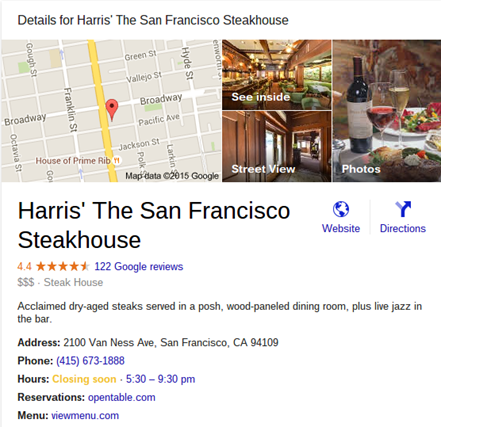4 Steps to Optimizing Local Search With Google
Nearly three-quarters of online activity is related to local searches. Using location-specific keywords and leveraging Google+ reviews can help optimize those searches to benefit your business.
Nearly three-quarters of online activity is related to local searches. Using location-specific keywords and leveraging Google+ reviews can help optimize those searches to benefit your business.
According to Google, an estimated 73 percent of all online activity is related to local searches. Customers turn to local search to learn about the businesses available in their area and evaluate what companies they would like to patronize.
For businesses who want to take advantage of the opportunities presented by these searchers, optimizing your Google local listing is an excellent way to get started. These listings are featured prominently in local SERPs on the popular search engine and are perfect for attracting attention and bringing in new customers.
An estimated 1 in 3 customers will do a local search on a smartphone before visiting a store. These customers are often looking for valuable, practical information such as the address of the business and the hours they are open. For your listing to be effective, you need to make sure that you fill in the information completely.
Not only will a thoroughly filled-in listing help to answer the questions of visitors performing local searches, but Google will also rank completed listings higher than those that are incomplete. The search engine giant understands that local users are better served by businesses that give them all the information they need. When they are given the choice between two similar listings with different levels of completeness, they will choose the one that offers more information.

This includes selecting accurate categories for your business. Google will give you suggestions about where your business may fit and you want to select the ones that describe your business best. Do not be afraid to select narrower, more precise categories than broader categories. These categories will impact where your site is displayed, and you want your site in front of the people who are most likely to be interested in your business. Google also assures business owners that users who search for broader categories will also be shown results from narrower categories:
“Don’t be afraid to choose specific categories instead of broad ones. The important thing is that the categories are accurate and describe your business well. Google’s search algorithm makes sure that users looking for ‘Book Stores’ will see businesses in more specific categories like ‘Used Book Stores,’ ‘Comic Book Stores,’ and ‘Rare Book Stores’ too.”
Google+ local listings use Google maps to generate locations and information for customers to help them understand where the business is and if it is close to their current location. Failing to correct any errors in your business location can end up confusing and frustrating these customers.
Google also places value on consistency throughout local listings for businesses. If there are discrepancies between your business listings on different directories, then your business results will rank lower because it can hurt the user experience. Wesley Young studied the impact of various factors on local search performance and found that the consistency of name, address, and phone number (NAP) on local business listings had a 16 percent influence in determining performance.
You should also be integrating location keywords into your local listing content. According to Young, keywords placed in business titles and when discussing the location of the business have a 19.6 percent impact on local search performance. You should look to use location keywords throughout the Google listing including in the title tag, H1 heading and URL. These keywords not only let Google know when your business is relevant, they also let customers know that this business is local.
Customers inherently trust reviews that come from other customers over advertisements that come from the company itself. According to Nielsen, 92 percent of customers say that they trust advertisements and recommendations from third parties more than traditional, paid advertising. Given the prominence of Google local listings on local SERPs, having multiple positive reviews can be incredibly helpful. The feedback will be displayed prominently right by your company name, encouraging people to click.

Reviews can also impact how well the business is listed on the Google SERP. Google understands the value that customers place on third party reviews and thus when a business has numerous positive reviews, the search engine assumes that this is a company that fulfills customers’ needs and should be featured more prominently.
Encourage your customers to leave you reviews by adopting some of the following practices:
Your website URL should be included in your Google+ local listing. Google will use information from the website to improve the search listings that appear on its page. This means your website needs to be easily read by search engines. Include a well-developed About Us page and Home Page that include keywords, the business address and quality content. The addition of rich media content, such as an embedded map that shows the business location also provides tremendous value.
Given the prevalence of local searches and the importance they place in the modern marketplace, taking the time to optimize your local listings page with Google can help you drastically boost your business. By focusing on the above areas, you will help Google to understand your value while also communicating with potential visitors what makes you special. It is this combination that will grow your traffic through local search.